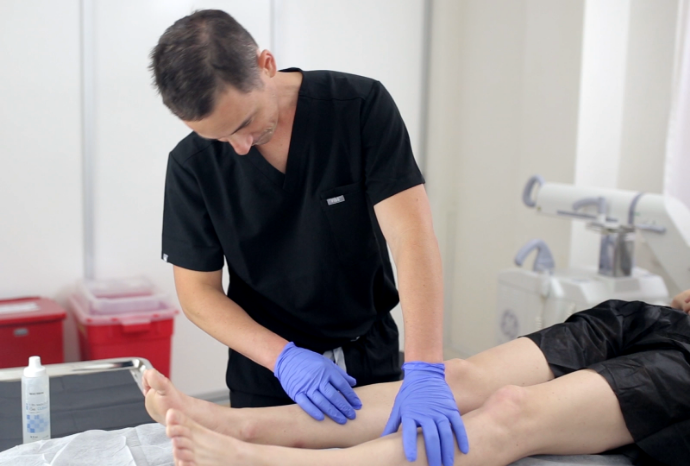Top Long Island Vein Doctors
What kind of specialist treats varicose veins? We describe the types of treatments available
What kind of specialist treats varicose veins?
Phlebology is the branch of medicine concerned with the prevention, diagnosis, and treatment of vascular problems, such as spider veins, varicose veins, leg ulcers, deep vein thrombosis, and chronic venous insufficiency. As such, “phlebologist” is the official terminology for a physician specializing in the diagnosis and treatment of varicose veins and other vein problems. You can also call phlebologists vein doctors, vein physicians, vein experts, vein specialists, vascular doctors, vascular surgeons, or vascular specialists.
Vein doctors can come from numerous fields of medicine, such as dermatology, anesthesiology, podiatry, general medicine, or cardiology. The primary qualification for physicians to practice vein care is a series of written examinations and tests, following which they become phlebologists. The barrier for entry into vein care is fairly low, so you must find vein doctors with specialized, advanced training in the latest minimally invasive spider vein and varicose vein treatments. If you’re in Long Island, you can visit our centers for vein treatment in Long Island.
What are the qualities of good vascular surgeons?
As mentioned previously, vein doctors come from all fields of medicine, and the barrier for entry into vein care is fairly low. As such, the market is full of vein doctors with limited experience with the latest vein treatments and techniques. They may lead to a high risk of side effects or complications, or they might not address the root cause of your vein problems, increasing the risk of vein disease recurrence. You should ideally find vascular specialists who focus exclusively on vein care rather than a jack of all trades. Below, we highlight the qualities of good vascular surgeons in Long Island.
Education & Credentials
You must find vein doctors with excellent education and credentials. They should have graduated from reliable and reputable medical schools, such as Yale Medical School, Harvard Medical School, and other Ivy League universities. The vein doctor should have also completed their residency program and fellowship training from reliable medical institutions, and ideally in subjects related to vein care, such as minimally invasive, ultrasound-guided spider vein and varicose vein treatments.
ABVLM Board Certification
The American Board of Venous and Lymphatic Medicine (ABVLM) is an organization that formally certifies the country’s top 1% of vein doctors. To get certified by the ABVLM, vein doctors must pass numerous professional milestones, such as residency programs and fellowships. The vein doctor must take a series of difficult written examinations and have a certain level of experience. As such, board-certified vein doctors are guaranteed to be the country’s leading experts in vein care.
Minimally Invasive Treatments
You must find vein doctors specializing in the latest, cutting-edge minimally invasive procedures to treat varicose and spider veins. Minimally invasive spider vein and varicose vein treatments are safer, more effective, and more convenient than vascular surgeries. They’re usually in-office procedures that conclude within 30 to 60 minutes with no downtime, allowing you to resume your daily activities immediately. Furthermore, minimally invasive procedures are extremely safe and involve a negligible risk of complications.
Insurance Verification
You must find vein doctors who provide free insurance verification for your varicose vein treatments. The vein doctor should provide insurance verification before your appointment, so they can offer a comprehensive breakdown of the treatment costs during the consultation. Furthermore, your vein doctor should also accept all major insurance plans, including Medicare. Varicose vein treatments are generally covered by most insurance plans if they’re deemed to be medically necessary — your vein doctor must help with insurance coverage.

What are the types of vein treatments?
Spider veins and varicose veins can be treated using numerous minimally invasive procedures. Each vein treatment is useful for different types of veins, different goals, and different people. Your vein doctor should examine your leg veins, understand your goals and symptoms, diagnose the root cause of your vein problems, and curate a personalized vein treatment plan. The following is a brief description of the different types of vein treatments in Long Island.
Radiofrequency Ablation
Radiofrequency ablation is a minimally invasive procedure for chronic venous insufficiency. The vein doctor makes a small incision on the skin’s surface to insert a catheter into the diseased vein. The catheter generates thermal energy to destroy the diseased vein, restoring optimal blood circulation to the heart.
Endovenous Laser Ablation
Endovenous laser ablation is a minimally invasive procedure for chronic venous insufficiency. The vein doctor makes a small incision on the skin’s surface to insert a catheter with a laser fiber that destroys the diseased vein with laser energy. The accumulated blood reroutes into healthier leg veins.
VenaSeal
VenaSeal is one of the latest treatments for chronic venous insufficiency. The vein doctor injects an FDA-approved, medical-grade adhesive into the diseased saphenous vein under ultrasound guidance. The diseased vein turns into scar tissues eventually metabolized by the body. The accumulated blood reroutes into healthier leg veins.
Amblatory Phlebectomy
Ambulatory phlebectomy is a minimally invasive procedure for superficial varicose veins. The vein doctor makes small incisions on the skin’s surface to extract the unwanted varicose veins.
Sclerotherapy
Sclerotherapy is the best minimally invasive spider vein treatment. The vein doctor injects a sclerosant solution into the spider veins to turn them into hardened scar tissues eventually absorbed by the body.
How to take care of veins?
- Wear compression stockings regularly
- Engage in cardiovascular exercises, such as running and swimming
- Walk frequently
- Elevate your legs above your heart’s level while sitting down
- Take frequent walking breaks if you have a desk job
- Drink lots of water to strengthen your veins
We know health insurance is confusing so we will help you check if you’re covered:
FREE Coverage Checker:

Visit Our Long Island Vein Treatment Center
Long Island
Vein Specialists
Meet your Long Island NY Vein Doctor
With Harvard Trained Medical Directors, our vein clinic Long Island sources only the top spider and varicose vein experts in the country.


Change your life
Join thousands of happy patients just like you
Vein treatments are often covered by major medical insurances, including Medicare. How do you know if your insurance will cover your vein treatment?
Contact us
CALL US
Speak with one of our team members to ask any questions you may have, verify your insurance and book an appointment at your earliest convenience. (631) 629-1118
BOOK APPOINTMENT
You can give us a call at (631) 629-1118 or fill out one of our forms here to request a call back; one of our team members will call you and help you verify your insurance coverage before booking your appointment.
Get directions
Visit us at our Long Island Vein Treatment Center located at 481 West Montauk Highway.